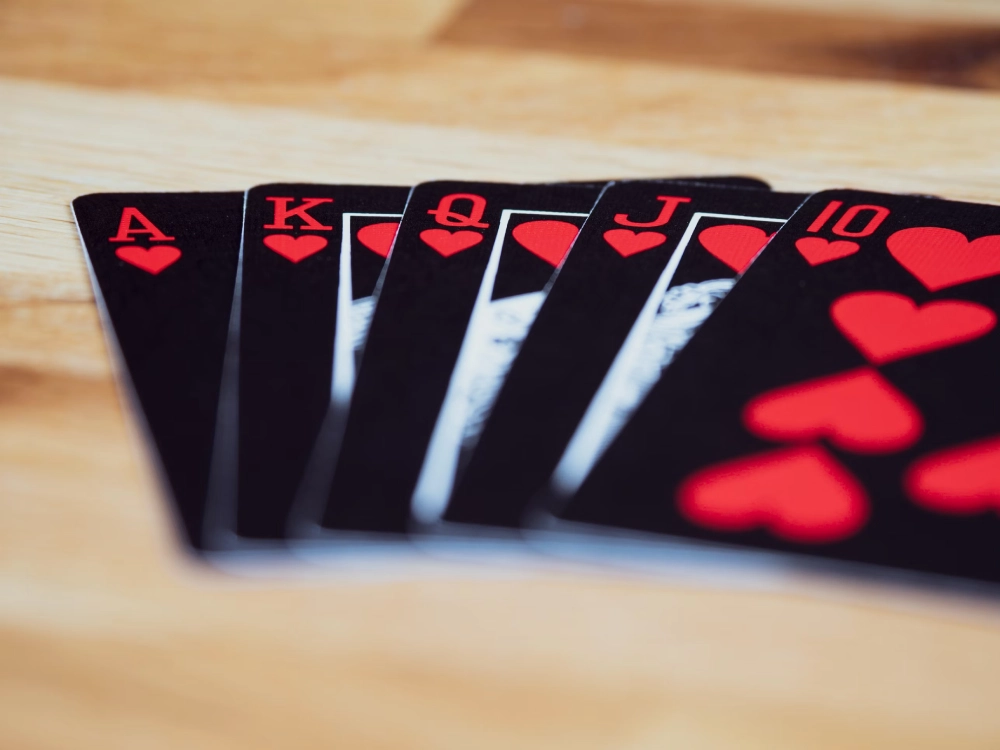
How to Play Poker: Essential Poker Strategy for Beginners
🗝️ Key Takeaways
- If you want to develop an unbeatable poker strategy, you need to first learn the basics. This means knowing hand rankings, betting actions, and the unique flow of Texas Hold’em, the most popular poker variant in the United States.
- Long-term success in poker relies more on strategic decision-making than on luck, so consistently applying core strategies like aggressive play, smart folding, and selective hand participation is essential.
- Seat position - Your position at the table might be the most important factor in the game. Observe the table dynamics and your opponents’ tendencies to ensure you’re making the right play at each stage.
- Developing a strong poker mindset - controlling tilt, maintaining focus, and balancing aggression with patience—directly impacts your performance and profitability at the tables.
- Change your strategy for various poker types and stages of play. This will help you stay on top of the game as your locals’ game styles and meta-game trends change.
- The greatest poker players understand that quality bankroll management protects you from variance and allows you to continue playing. Set concrete guidelines and stick to them, no matter how long you’ve been playing or how advanced you are.
Poker strategy is about playing the math, playing your opponents, and playing your bets to win more hands than you lose over the long haul. In the U.S., the game most players jump into is Texas Hold’em. They learn when to play premium hands and when to let trash go, controlling the action at the table.
Good strategy combines technical skills such as reading betting patterns and calculating odds with an intuitive understanding of how opponents think. The best poker strategy requires strong decisions, cool heads—and no small amount of discipline.
Reading chip stacks, seat spots, who opens what, how players play, and the ability to take that all in provides a MASSIVE advantage. To build a winning habit, many players track games and study how pros in Las Vegas or Atlantic City win.
The following sections explain these concepts in further detail.
🎯 What Defines Poker Strategy?
What sets poker strategy apart from other games of luck is that strategy is rooted in mathematics, psychology, and calculated risk. Players engage in an activity that transcends mere compliance with the poker rules. They must consider every decision at the moment, considering both probabilities and human psychology.
The essence of good strategy starts with understanding every nuance at the table.
🚀 Moving Beyond Basic Rules
Too often novices approach poker as a gut-based game or a luck-based card game. Real strategy is understanding fold, call, or raise based on pot odds and probability of winning.
For example, if your pot odds are worse than the odds of making your draw, you should fold. Position further influences the choices that are made. Since players in early positions are required to act before most of the rest of the field, they must have stronger hands to play.
On the other hand, late-position players are able to widen their ranges and be less straightforward. Even the best players know all about implied odds. When you have a good drawing hand, you may choose to call despite low odds.
You’ll know that when you hit that one card from the deck, you’ll be able to win larger pots in the future.
📊 Why Strategy Beats Luck Long-Term
Luck can certainly affect short-term outcomes. However, over the long run, strategy always prevails. This is where game theory becomes powerful.
Players employ equilibrium strategies—bluffing, value betting, folding at the right frequencies—to not be exploitable. Poker professionals obsess over these frequencies, looking for plays that are unexploitable by astute players.
🔥 My Philosophy: Calculated Aggression Wins
Aggression isn’t simply throwing out large bets. It’s understanding which bluff will get players to fold, when you should check-raise, and being able to read the table.
Remaining in the lead by embracing emerging trends and new players is what maintains your supremacy. The greatest players are chameleons they adjust, change their game, and keep an advantage over their rivals.
🎲 Solidify Poker Game Fundamentals
Poker, more than anything else, favors a clear mind and an understanding of fundamental concepts. Before a player can build advanced skills, it is worth locking down the nuts and bolts that shape every hand and session.
These fundamentals make for a strong base for any strategy. They create an environment for expansion, whether you’re playing in San Francisco cardrooms or in the comforts of your own home.
🔍 Know the Objective Clearly
The main goal in poker games is simple: win as many chips as you can by making better choices than your opponents. Focus on value betting hands that are likely best.
Drawing with the odds against you is an easy mistake to make, so fold when the odds aren’t in your favor. Make it a habit to constantly be considering, “How good is my hand?”
This one question will keep you focused on the risk vs. reward for every play.
🧩 Understand Game Flow Step-by-Step
Each hand of poker has a distinct flow. Deal, pre-flop, flop, turn, river, showdown. Understanding game flow step-by-step allows players to recognize opportunities to bet, raise, fold or check.
Making sure you’re clear on the flow brings you back to earth and saves you from making mistakes when things get serious.
📈 Master Poker Hand Rankings
No tool is more important than just plain knowing hand rankings cold. A flush beats a straight, three of a kind beats two pair, and so forth.
If you want to take your game to the next level, then it’s essential to understand poker ranking hands. Knowing how these rankings work gives you an edge in your strategic planning. It helps you make a more accurate read on your opponents’ hand strengths.
Whether you’re in the big bucks tournament of the year or your nickels-and-dimes home game, knowing what beats what is absolutely essential.
It really does help, and we mean that! When you get dealt a full house, bet like you mean it. You realize that your hand beats a flush and a straight.
Once you’ve mastered poker ranking hands, you’ll be able to make smart betting, calling and folding decisions at all stages of the poker game.
Knowing where you stand enables you to identify when you hold a winning hand and determine whether to bet or fold at every stage.
💰 Learn Betting Actions Inside Out
Betting, calling, raising, and folding are the fundamental actions in poker. Aggressive, disciplined play—a.k.a ‘ABC’ poker—requires betting when you have the best hand and folding when you don’t.
Incorporating bluffs at appropriate times, as suggested by game theory, makes your game difficult to predict. Understanding betting rules also helps structure how and when to size your wagers.
♠️ Focus on Texas Hold'em First
Texas Hold'em is the poker game played in casinos and homes across America and around the world more than any other. Its rules and betting progression established the template for all subsequent variants to follow.
Mastering Hold’em creates a solid foundation to branch out and learn other types of poker games.

🏆 Core Strategies to Boost Your Game
A winning poker strategy consists of some simple, well-defined actions that will help you dominate the felt. Every move requires focused strategy and a clear understanding of the deck and opponents you are facing. The elite players distinguish themselves by mastering these fundamentals and by identifying the little cracks in their opponents’ games.
These strategies are potentially the backbone of a strategy that is very effective at cash games in the U.S. and other English-speaking poker frontiers. They work in tournament atmospheres.
1. Play Fewer Hands, More Powerfully
So, how do players choose which hands to play? That’s all they do - they fold weak hands and play their good ones with incredible ferocity. This tight-aggressive style prevents players from ever getting into tough spots and allows them to bet aggressively when they have the advantage.
For example, playing tighter with ace-king or high pairs from an early position makes players more likely to be in the lead. Understanding betting rules here is key—when you raise from early position, it signals strength and demands respect.
2. Stop Limping Into Pots First
Whether folding or raising, never limping allows your actions to be more transparent while maintaining the initiative in the hand. Limping lets others see cheap flops and invites trouble, especially at tables with aggressive poker players common in cities like Las Vegas or San Francisco.
3. Use Draws for Aggressive Semi-Bluffs
Incorporating aggressive poker strategies like semi-bluffs keeps opponents on their toes and builds larger pots when you connect. For instance, if you have a flush draw, using quick poker tips such as betting strong can force folds from weaker hands, setting up a bigger win.
Knowing when to semi-bluff comes with experience—and helps elevate your performance by mixing up your play and keeping your game unpredictable.
4. Bet Strong Hands Fast for Value
When you hit a strong hand, don’t wait. By allowing free cards, slow-playing reduces your advantage; instead, employ quick poker tips like fast playing to maximize your pot size and fold equity.
5. Defend Your Big Blind Smartly
Utilize effective poker strategies by calling or raising from the big blind only with strong hands that perform well against most likely raisers. This will help prevent small raises from taking your blinds for nothing.
Understanding betting rules helps you judge when a defense is mathematically correct or when to just let it go.
6. Fold When Genuinely Unsure
If you’re in over your head, consider applying quick poker tips and give up to conserve chips and reduce losses over time. This habit boosts long-term performance and prevents tilt.
7. Attack Opponent Weakness Signals
When an opponent double checks or looks scared, applying quick poker tips like making a big bet can win most pots. Keep an eye out for these areas and attacks when you feel vulnerability.
Your experience reading tells and body language will inform how and when to pull the trigger.
8. Treat Early Tournaments Like Cash Games
Don’t go all-in and take unnecessary risks. Early in a tournament, applying effective poker strategies is crucial; you should play like you do in a cash game - tight, steady, and with more controlled aggression to build a stack for larger bets.
Sticking to this approach helps reinforce good betting rules and sharpens your focus on stack preservation and growth.
9. Select Profitable Games Wisely
Don’t play against hard competition; instead, seek out tables where the other players lack optimal poker skills. Smart game selection is a hidden edge that experienced players use to maintain high performance.
10. Avoid Bloating Pots Mid-Strength
With hands like middle pair, avoid bloating pots - instead, focus on effective poker strategies and only inflate the pot when you expect to have the best hand.

🔑 Key Factors Influencing Decisions
Smart poker strategy combines many different elements—skill, math, and people instinct. Every hand deals new intelligence and a requirement to balance danger with prudence.
It’s all too easy for new players to get caught up in the idea that a good hand equals an automatic victory. For example, if they encounter a 71% chance, they might interpret that as a definitive success. They fail to realize that luck still plays a role in every single deal.
Even the best and brightest — from physicians to attorneys — can fail to recognize the risks associated with misinterpreting probabilities or allowing prejudices to inform decisions. In poker, luck plays a huge role. It’s through faith in skill and keen, logical thinking that players will be truly victorious in the long run.
♟️ Leverage Your Table Position
Where you sit literally determines how you win and lose. Early positions have the advantage of going first, so you are forced to play more conservatively.
Late seats see more of the board’s moves and get to react last. This allows you the leverage to replicate pots or bluff with more fragile hands. In high-stakes home games in San Francisco, regulars often challenge all-in from the button.
They’re able to do this because they get to see how everyone else bets ahead of them. This advantage, often only a 2% improved probability, can really make the difference over hours spent at the table.
♦️ Understand Hand Ranges
Just like in poker, understanding what hands you and others have goes a long way to removing fuzzy areas. You transition from estimating single hands to considering ranges—as in, all the possible ways someone can call a bet.
Game theory and payoff math can go a long way toward pinning down those choices. Misjudging these ranges, similar to the beginner presuming poker has 54 cards, results in expensive mistakes.
♣️ Read the Table Dynamics
See the chips fly and see the crowd go wild. Some games are played pretty loose, some tight.
At California card rooms, recognizing changes in mood or betting speed allows you to know when to call or fold.
♥️ Adjust Based on Opponent Tendencies
Great players recognize trends. Some of the people who make important decisions are bluffs, some are people who fold under pressure.
Counter your opponent’s moves to these habits, and you have a very real advantage. Sometimes, winning the hand just means winning the fold, and that’s as important as any hand you’ll ever hold.
💡 Sharpen Your Poker Mindset
A focused attitude creates the foundation of any successful poker player. One of the most critical aspects of winning more hands is your mindset. It’s not about what cards you’re holding – it’s your mindset and your decision-making ability that’s key to poker. Good players in places like San Francisco poker rooms or online tables know that mental skill can swing a session.
The concepts listed out, one by one, can sharpen your poker mindset to improve your game.
💸 Control Tilt Before It Costs You
Tilt will wipe out a whole session of good poker. After a huge loss, when stress is at its peak, your decision-making ability decreases dramatically. Take a break for a few hands if you sense you are getting angry or frustrated.
This is another reason why recording your sessions - often referred to as game tape - is valuable to identify what triggers you and how that impacts your play. A lot of the pros will watch these tapes back after their sessions, identifying what they did wrong and then adjusting accordingly.
Whenever poker begins to feel like more of a job than a hobby, step back and evaluate your mindset. In other words, at times a break is worth more than the cost of taking one.
👑 Cultivate a Strong Table Image
Creating the right table image is essential. How your opponents perceive you at the table largely determines how they will play against you. When you play the same way all the time, you’re a lot easier to figure out.
Don’t be predictable - mix your moves up. Avoiding predictability is key. Don’t be a robot and always play the same hands from the same spots. Smart players never enter a session without a goal in mind.
Maybe they plan to get in X number of hands today or test out a new style of play. Prepare yourself before you even sit down, visualizing hands and potential spots. This really gets your brain firing and allows you to pick up on tells or patterns.
⚖️ Balance Aggression with Patience
Aggression may win you more pots, but patience will save you more money. The smartest players in the Bay Area, or any other town, are the ones who understand how to balance aggression with patience.
To manage variance is to be calm and cool, to take the right actions, and not worry about the inevitable swings. Some days, you’re just going to have the bad luck cards. Be disciplined.
Stay true to your strategy - identify the moves you need to make and ignore wins and losses, and focus on that. If you notice your concentration going, consider sticking to one table at a time.
🧠 Play Only When Focused
Distraction is a recipe for disaster. If you are fatigued or your focus drifts, performance will falter. Even quick warmups, such as hand history reviews or a few shortish sessions, will help establish and reinforce your focus.
When you’re not in the mood to play, play for five minutes or five short hands. Most of the time, you’ll be in the zone. Learning from your mistakes - whether by going back over a session or simply discussing hands with your poker buddies - accelerates your learning exponentially.
🎲 Adapt Strategy Across Poker Variants
Changing poker variants requires much more than simply understanding the rules. Every variant has different quirks, and even the most accomplished players can find themselves at sea when the game shifts. Spending time understanding the fundamentals and then putting in hours on the felt will not only develop skill but confidence as well.
To become a better player, you need to know what hands are worth playing. They need to understand how wagering differs and understand what each game offers. Small changes in strategy yield small wins that build confidence and momentum.
🃏 Adjusting for Omaha Differences
Omaha is notorious for tripping up players who are used to Texas Hold’em. In Omaha, participants receive four cards rather than two. They need to play precisely two cards from their hand and three cards from the board.
That’s because the opportunity to make big hands is significantly greater, making starting hand strength more important. Conversely, drawing hands - those with many avenues to improvement - are more common. Players who don’t adapt this strategy across variants get burned.
Or, they might overvalue hands that would be strong in Hold’em but poor in Omaha. Adapting means opening your starting hands range to stronger cards and valuing nut draws.
🔄 Strategy Shifts for Stud Games
Stud games, for example, Seven Card Stud or 2-7 Triple Draw, require a separate level of attention. Since most hands have a few cards face-up in Stud, knowing what cards have been dealt creates a significant advantage for keen players.
In games such as 2-7 Triple Draw, where the lowest hand wins, having a flush or straight is a bad thing that will only cost you money. So first time players coming from Hold’em to Stud must unlearn how they interpret hands and reimagine what’s worth investing in.
🏆 Tailoring Approach for Tournament Phases
Like real-life big ideas, tournament poker requires that players adapt their strategy as the tournament progresses. Early on, with deep stacks, it’s a good idea to raise a wider range and play in position to see more flops.
As the blinds increase, it becomes more dangerous and so a style that is tighter and more conscious of bet size becomes more effective. The indifference principle - Risk vs. Reward - allows players to adapt when the pressure cooker starts to boil.

🎓 Explore Advanced Poker Concepts
Taking your poker game to the next level involves learning some of the subtle nuances that separate good players from great players. It’s a game that evolves quickly, and understanding how to apply advanced tactics is what allows you to stay ahead.
San Francisco ethnic card rooms draw a wide range of players. This diversity ensures that you will be playing against different, unique styles and skill levels each game. These advanced concepts will make you clean up, adapt, find edges, and make money more consistently at any table.
📊 Grasp Game Theory Optimal (GTO) Basics
GTO isn’t about playing in a way that can’t be beaten over the long term. Of course, it means choosing starting hands, bet sizings and bluffs that are always balanced, so that your opponent can never exploit your strategy.
Let’s assume you have 8♥ 7♥ and the flop is K♣ Q♣ 6♥. GTO play would incorporate a bluff in this spot, with your backdoor draws helping you maintain a wide enough range. Overbetting is a lesser-known GTO move.
When you’re on boards that you have the nuts, it’s logical to overbet the pot. Your range is stronger, and you are at an advantage in this dynamic situation. In multiway pots, pocket pairs become extremely valuable. They can only flop a set about 11.8% of the time, which is an important fact when it comes to devising a strategy based on GTO.
⚡ Use Stats to Exploit Opponents
Stats such as VPIP (voluntarily put in pot) and aggression frequency let you know which players are loose or tight. When an opponent is folding a lot to big bets, you can bluff more frequently with hands like suited connectors on challenging flops.
By check-raising draws after a 3-bet you’re putting massive pressure on your opponents. Besides bluffing them off bad calls with a nut flush blocker on a wet board.
⏩ Stay Ahead of Meta-Game Shifts
Players are quick to catch on. If you just stick to the same old plays, the rest of the field will figure it out. Monitor adjustments - such as increased check-raises or increased value bets on the river - and adjust your ranges accordingly.
In San Francisco’s no-limit cash games, stay ahead of the meta-game changes. With an increased frequency of multiway pots, you’re going to want to emphasize hands that can make two pair or better by the river.
📚 Learn From Your Mistakes
Even the best players study their hands. If you fail to extract value with a strong holding or misfire on a bluff, make a note.
With practice and a commitment to learning from these mistakes, you’ll experience consistent improvement.
💥 Recognize the Power of Positioning
Table position at the poker table determines what moves are available to you and when. Good seats let players see how others act before choosing, while early spots put pressure to act with less information.
In reality, a player “under the gun” is the first to act after the blinds. Yet they must do so without knowing which of their potential opponents will call, raise, or fold. Late positions - such as the cutoff and the button - allow players to see every player’s action before making theirs.
Even though this advantage is basic, it’s enormous. You receive more information, therefore your decisions become more precise. For example, if a player on the button in a Texas Hold’em game sees everyone check, they know the pot is open to a small bet.
If they can identify that power of positioning, they can use that to steal the pot, even with weak hands, simply by betting at the right moments.
This advantage becomes apparent in real-life play. When you are in a late position, play a larger range of hands.
You can make a big call or raise purely on how other players are playing besides your cards. An early position player needs to be more conservative and play stronger starting hands, as they have more unknowns to deal with.
Folks in late spots can risk more with hands like suited connectors or lower pairs, since they already know what others have done. This is playing out in actual games from home games in the Bay Area to casinos in Las Vegas.
Regular players like to complain about how much simpler it is to win pots from late position. This isn’t luck—it’s baked into the nature of poker.
Savvy players use this edge in other ways that don’t even involve hand strength. These strong players will frequently “float” in late position.
They continue to the flop bet with a marginal hand, prepared to bluff if their opponent demonstrates any kind of weakness on the turn. Since they act last, they have much more power over the pace and size of the pot.
That results in more victories even with mediocre hands. This isn't all hypothetical. It is no coincidence that players in late positions tend to win more often.
They lose more money over time, based on complex data from actual games, both online and in brick-and-mortar establishments. This is especially evident from high-stakes pros all the way to weekend hobbyists.
The lesson is clear: where you sit at the table shapes your odds as much as the cards you hold.
🛡️ Protect Your Poker Bankroll
A healthy poker bankroll is not just a big stack of chips. It is the foundation for the kind of long-term play we all aspire to, and a protection from the variance that every player will experience. In the U.S., players in cities such as Las Vegas and San Jose are painfully familiar with the risks.
They know that gambling beyond their means can be hazardous. Poker success is all about smart risk, not playing with luck.
💰 Why Bankroll Management is Crucial
The reality is that everyone goes through it, even the best in the world. The money you set aside to play poker should never come in contact with your rent or your utilities. This prevents losses on the felt from translating into real-world issues.
Cash game players typically want to have a minimum of 20 buy-ins, though you should aim for 40-50 buy-ins for additional peace of mind. A large enough bankroll will allow you to weather downswings and stay in the game. It provides you with a chance to recoup your losses.
For those aiming to move up, it is wise to wait for at least 50 buy-ins at the next level. Variance, aka luck, can go both ways with a vengeance—a larger bankroll safeguards your place at the table.
⚙️ Tailor Rules to Your Game/Level
After all, every player is unique. It's better to say that a new player at $1/$2 no-limit will need a different bankroll than a seasoned pro at higher stakes. Your level of play and comfortability should dictate your decisions.
At $2/$5 and up, the swings have the potential to be massive - tailor rules to your game/level. Adjust your rules as you get better if you begin playing at higher stakes.
🧘♂️ Stay Consistent Through Swings
Poker is a long-term endeavor – a grind as opposed to a sprint. Long losing streaks are a natural occurrence. Patience and playing within your limits fosters discipline and ensures you stay in the game.
It involves a bit of pain. Unfortunately, building from scratch does not happen overnight. Avoid putting too much pressure on yourself by setting small goals and try to remain positive even if initial results don’t swing in your favor.
🔒 Conclusion
To get the most out of playing smart poker, effective sharp reads and gut instincts come into play. Keep an eye on the table and notice patterns. Change it up, don’t pigeonhole yourself into a box. Step one is to learn the fundamentals right. Next, test your new techniques at home, such as micro-home games or low-stakes rooms in cities like San Francisco or Reno. Support your move with solid math and you’ll see your chips grow. Stay frosty, don’t allow tilt to destroy your vibe.
It’s a real skill that only comes from hours spent at the feet, not sitting in a classroom. Poker is a game of surprises - you learn something with every hand. Looking to improve your game? Exchange ideas and strategies with your friends, join a local poker club or stay informed on the latest strategies and trends. The proper mindset will do wonders to ensure your strategy remains dynamic and your funds protected.
Frequently Asked Questions❓
What is the main goal of poker strategy?
The ultimate objective of poker strategy is to maximize profits and minimize losses, which necessitates employing effective poker strategies, utilizing math, psychology, and optimal play to enhance your poker skills.
How important are poker fundamentals for success?
A strong mastery of poker fundamentals such as hand rankings, position, and betting rules underpins effective poker strategies and long-term success.
What factors should I consider before making a poker decision?
The main factors in effective poker strategies include your position at the table, the strength of your hand, your opponent’s tendencies, the pot odds, and your stack size. Always consider these elements before making a decision.
How can I improve my poker mindset?
Don’t tilt, cover your losses, and concentrate on making the right plays. Utilize quick poker tips and effective poker strategies by stepping away and evaluating your play objectively at the end of each session.
Why should I adapt my strategy for different poker variants?
Each variant of poker, whether it's online poker or live poker, is unique in its rules and dynamics. By implementing effective poker strategies, you enhance your poker skills and increase your chances of capitalizing on each variant's opportunities.
What are advanced poker concepts I should learn?
Understand advanced poker concepts such as bluffing, pot odds, and reading your opponents. It’s these poker skills that differentiate the newbies from serious players and enhance long-term winnings.
How do I protect my poker bankroll?
Implementing effective poker strategies includes setting clear boundaries and avoiding playing with funds you cannot afford to lose. Proper bankroll management enhances your poker skills, allowing for longer play and reducing stress during the game.




























